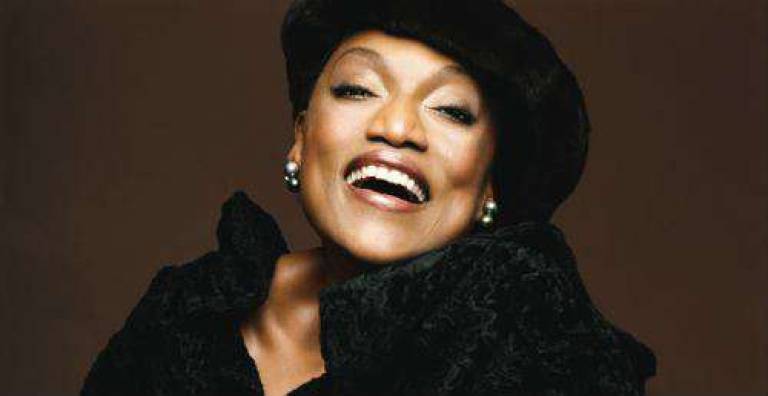Return of the Poet

Langston Hughes' "Ask Your Mama" gets a one night only revival
By Valerie Gladstone
Emmy-award winning composer, Laura Karpman, started thinking about staging Langston Hughes' twelve-part, epic poem, "Ask Your Mama: 12 Moods for Jazz" when she came across it in a bookstore six years ago. Begun by the great poet in 1960 while attending the Newport Jazz Festival, where the likes of Dizzy Gillespie, Louis Armstrong, Ray Charles, Muddy Waters and John Lee Hooker performed, it celebrates the African-American fight for artistic and social freedom. The poem was revived in Karpman's one-night staging at the Apollo theater last weekend.
"It's gorgeous ? a masterpiece," Karpman says on the phone from Los Angeles recently. "What persuaded me to take it on was Hughes' explicit musical direction. His hand is everywhere. He'd planned to produce it with [bassist] Charlie Mingus. The different elements, like a mash-up, actually fit more in the present than even in his own time. I thought, what an opportunity. I can work with this amazing poet.'"
Inspired by the work's passion and complexity, she transformed Hughes' haunting poetry into a multi-media production, combining video clips, spoken word performance, samples of original jazz recordings, German lieder, gospel, Jewish liturgy and African drums with Hughes as the primary narrator. The Manhattan School of Music Sinfonia, under the direction of George Manahan, and a superb cast, featuring singers, Jessye Norman and Nnenna Freelon, Meshell Ndegeocello on bass and the spoken word artist, Roger Guenveur Smith, add layers of meaning and emotion to the overall concept.
Karpman's first move when she started the project was to enlist Norman as her co creator. The singer's story somewhat replicates that of Leontyne Price, one of the first African Americans to sing at the Metropolitan Opera House and a historical character featured in Hughes' work. Once she was on board, nothing could stop Karpman. "The poem tells an incredibly artistically nuanced story of race, slavery and poverty and who benefits in our society," she says. "It takes everyone out of their comfort zones." A seasoned collaborator, she not only writes music for films and television but also for video games and thrives on bringing together different artistic forms. .
Freelon credits Karpman with creating a groundbreaking work, without using any tricks or sacrificing the poem's beauty. "When Laura and Jessye put their heads together, all that talent they both have came together in a new cultural high," she says. "Jessye's kindness and beauty as an artist gave us all space. You come to realize that the music is more important than you are. It's been the ride of a lifetime - and I've been on the road for 35 years."
"Ms. Karpman's music, melding Ivesian collage with club-culture remixing, morphed from one vivid section to the next in a dreamlike flow," wrote Steve Smith in The New York Times at the premiere at Carnegie Hall in 2009.